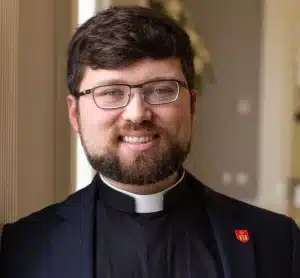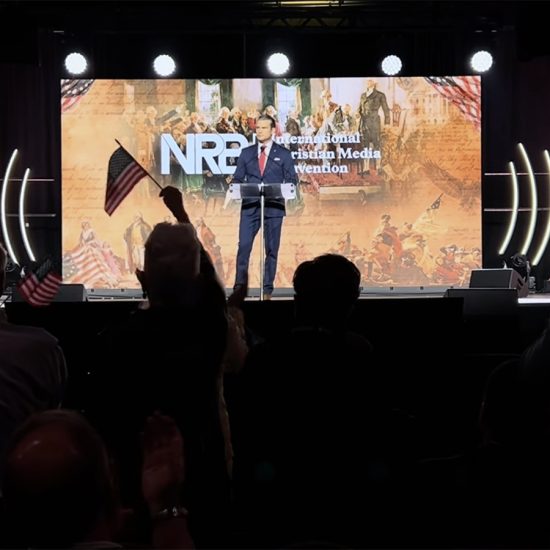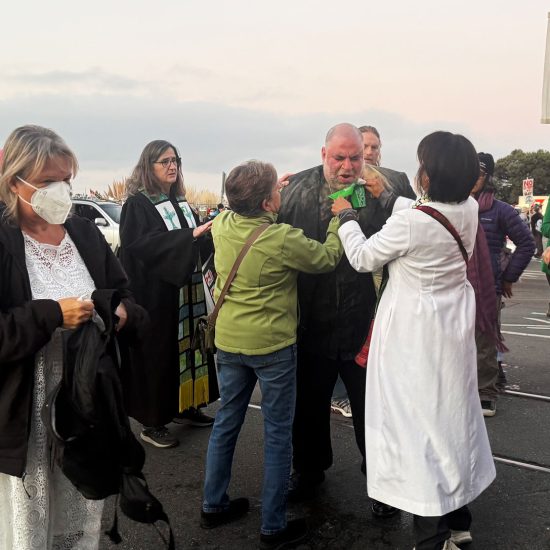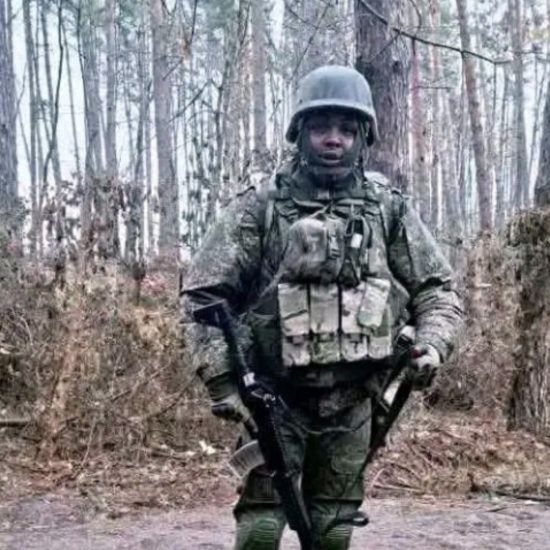
In an important panel discussion with the Christians Against Christian Nationalism initiative and Jim Wallis last week, Episcopal Church Presiding Bishop Michael Curry underscored an important fact: Christian Nationalism* is not Christianity.

Nathan Empsall
“If you look at the complex of white Christian Nationalism as an ideology,” Curry warned, “you lay it alongside Jesus of Nazareth and we’re not even talking about the same thing.”
Curry, like so many other prophetic Christian leaders, is right. Where Jesus taught love, peace, and truth, Christian Nationalism preaches division, violence, and disinformation. Yet with hundreds of right-wing political candidates using Christ’s name to deny election results, demonize their opponents, and spread discrimination – all with the blessing of far too many evangelical pastors and activists – Christian Nationalism is the single biggest threat to both democracy and the church today.
Christian Nationalism is defined by multiple academic researchers and sociologists as a theocratic political ideology that says America was founded to be a Christian nation, claims that the only true Americans are the country’s Christians, and frequently overlaps with white supremacy. It falsely teaches that there is no separation of church and state – and urges conservative Christians to seize and hold power by any means necessary.
This is the ideology that inspired the January 6 insurrection, organizes countless attacks on Americans’ equal rights, and could soon inspire a new wave of midterm political violence with rhetoric about “holy war” and the “armor of God” if the elections don’t go their way.
In his panel at Georgetown University, Presiding Bishop Curry urged Christians to speak out about this hijacking of our faith: “Silence is complicity… Lift up the text of the New Testament, specifically the four Gospels … and let Jesus talk. Anything that claims to be Christian, if it doesn’t match up, then we say, ‘Well, that’s not Christianity.’”
That’s precisely the goal of the newest campaign from the organization I run, Faithful America, called “False Prophets Don’t Speak for Me.” To help Christians recognize and respond to Christian Nationalism when they see it – in the public square as well as in our churches – we have identified a list of 20 leading Christian Nationalist leaders who, as Jesus warned, come to us in sheep’s clothing yet inwardly are ravenous wolves who devour the oppressed, the marginalized, and the least of these.
Our list includes three categories of False Prophets. The first category consists of political leaders who claim to speak for Jesus, using religious rhetoric and symbols to build their careers only to turn around and endanger the public with election denial, homophobia, antisemitism, Islamophobia, patriarchy, and other attacks on the common good.
This category includes Colorado Representative Lauren Boebert, who claims the separation of church and state doesn’t exist, Arizona gubernatorial candidate Kari Lake, who has built her campaign on Donald Trump’s Big Lie along with the slogan “God, guns, and glory,” and Missouri Senator Josh Hawley, who led the charge to overturn the election within Congress on January 6, 2021.

Natilyn Hicks / Unsplash
The second category of False Prophets is made up of other political leaders who may not use as much overt religious rhetoric as their peers named above, but who nevertheless endorse the same theocratic political agenda, help build power for their fellow Christian Nationalists, and attack equal rights despite personally identifying as Christian. Arizona Senate candidate Blake Masters and Ohio Senate candidate J.D. Vance both fit that description. This category reminds us that many leaders and teachers realize that the First Amendment is actually still pretty popular, and thus try to hide the theocratic nature of their agenda.
The final False Prophets category names some of the pastors, televangelists, and other movement leaders who build the long-term infrastructure that the religious right uses to thrive in church and society. These are the faith leaders who provide church cover to the lawmakers who twist Jesus’s name for power, and who manipulate their followers as a political base rather than as souls looking for spiritual education and pastoral care.
Some examples from this last category are Franklin Graham, who gets away with saying election denial and MAGA conspiracy theories are “what God says in the Bible” by hiding behind his dad’s legacy, Michael Flynn, who brings dozens of QAnon-spouting pastors to churches around the country on the ReAwaken America Tour, and David Barton, the evangelical pseudo-historian partially responsible for manipulating voters into believing that well-funded national attacks on school boards are grassroots “parents’ rights” movements.
That’s why it’s incumbent on those of us who identify as Red Letter Christians not to remain silent. We must recognize the harm that is being done in our name, and call out the blatant abuse of the Gospel of Jesus Christ. A big piece of the False Prophets campaign is lifting up the prophetic voices of faith leaders around the country who are resisting Christian Nationalism in their communities. As one of our volunteers, Ohio Lutheran Pastor Beth Westphal, told us, “J.D. Vance’s embrace of Christian Nationalism inspires discrimination, division, and discord cloaked in the language of faith. As a clergy person, I cannot sit quietly while such harm is done in the name of Christianity.”
Here are three things we can all do right now to push back on Christian Nationalism: First, make a plan to vote your red-letter values, if you haven’t already. Are you still registered to vote? When will you vote, and how will you get to your polling place or dropbox? Are there voter ID requirements in your state? Learn the answer to these questions and more at Vote 411 from the League of Women Voters now.
Next, educate yourself about Christian Nationalism. One starting point is to watch the new webinar “The Threat of Christian Nationalism” from Faithful America featuring myself, historian Dr. Jemar Tisby, Rev. Jen Butler of Faith in Public Life, and Rev. Adam Russell Taylor of Sojourners. (Stick around for the Q&A – Professor Tisby’s list of three ways to talk to the Christian Nationalists in your life is particularly helpful!) Then share what you learn with friends, family, and church members, sign and share the “False Prophets Don’t Speak for Me” statement, and find a local organizing group where you can put your new knowledge to good use.
Finally, pray. Pray for justice, mercy, and humility. Pray for peace, hope, and courage. Pray for our Christian Nationalist siblings in Christ, pray for the country, and pray however the Spirit may lead you. We know from the “thoughts and prayers” discourse around guns that prayer alone is not enough, but as Christians we also know that when prayer is combined with action, it becomes a powerful tool for hope, connection, and a better tomorrow.
Nathan Empsall is the executive director of Faithful America. He is an Episcopal priest and experienced organizer who holds both a Master of Divinity and a Master of Environmental Management, as well as a B.A. in government and Native American studies. He has worked for numerous Episcopal Church dioceses and organizations including at the United Nations, is a volunteer member of his denomination’s Task Force on Care of Creation and Environmental Racism, founded the independent Episcopal Climate News, and serves as a part-time parish priest. Follow him on Twitter @NathanEmpsall.
*Our style at Word&Way is to capitalize the “N” to start nationalism, even though many other journalists and scholars don’t. Why? Because we capitalize the names of religions. And it’s why we spend time confronting this heretical co-option of our faith. Christian Nationalism isn’t Christian.






